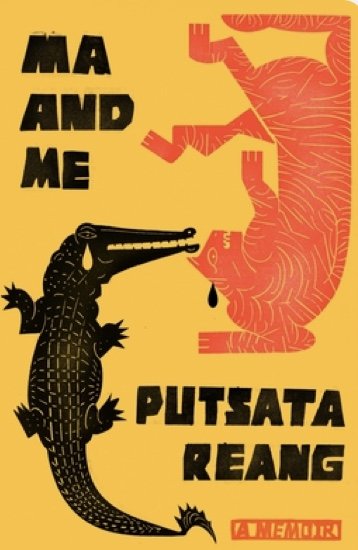Ma and Me: A Memoir by Putsata Reang (Farrar, Straus and Giroux)
Ma is a woman with a “face spangled with light.” She took her children away from Cambodia’s genocide and brought them to a small town in Oregon, a place where she and her husband found a house and established their reputations as a leading Khmer family in the area. “Use your brain, not your back,” she tells her children, and shows them the consequences of ignoring her advice by taking them to the fields of berry farmers and harvesting crops for money every summer. Quickly they all learn to listen to Ma. All of them succeed in moving far from lives of physical labor.
On the ship that carries her family from Cambodia to a refugee camp, Ma holds tight to Putsata, her dying baby whom she manages to keep alive. “My first feeling was flight,” Putsata says of the memories she has inherited from that voyage. When she turns two, Ma teaches her a game, “Run and hide,” one that the little girl plays so often that it “forms into habit,” her “very best skill.”
“Both of us are storytellers,” Putsata says. Ma carries a storehouse of Cambodian fables and myth, while her daughter becomes a journalist who quests for facts that might hold truth. The presiding fact in Putsata’s life is one she’s always known: Ma is the savior and Putsata is the saved. “I owed Ma my life,” and in return Putsata “tried to live an immaculate life.” She goes off to work in Cambodia, becomes fluent in Khmer, helps her relatives who survived the Pol Pot years. She turns herself into a model daughter and “Ma made a myth of me.” Nothing seems to shatter that myth, not even when Putsata tells Ma that she’s gay, right up until the day that she discovers that her mother never believed that disclosure was true.
When she finds that she needs to choose between the woman she will marry and Ma, Putsata becomes “the single flaw in the beautiful fiction of a family Ma spun for the Khmer community.” Without bathos or drama, she conveys the agony that racks her mother and herself in the moment when long after their voyage to safety ended, “Ma had cast me overboard.”
Memoirs have become a tiresome genre but Putsata has set an impossible standard of excellence with hers. Intertwining Ma’s folktales with the story of her mother’s life and her own, she burnishes this with the language of a poet. When her abusive father attacks one of her young cousins, the blood seeping from the child “lying like a broken bird on the floor” is “the color of fresh berries.” When she visits the death chambers of Tuol Sleng, she feels “the million pinpricks of guilt, shame, and sorrow…calcify in me like a new bone.” The Cambodian monsoons strike as if “through a single slit in the sky, an entire sea crashed onto the land.”
Whether she’s a child working in Oregon’s strawberry fields, “zombie-like and without complaint,” or an adult alone in the country of her birth, seeing it as “an entire nation of the walking wounded,” “so physically beautiful and yet stained with such a grim past,” Putsata takes her readers with her, imbuing them with her sense of beauty, her scalding honesty, her refusal to indulge in self-pity, and her extraordinary history.~Janet Brown
